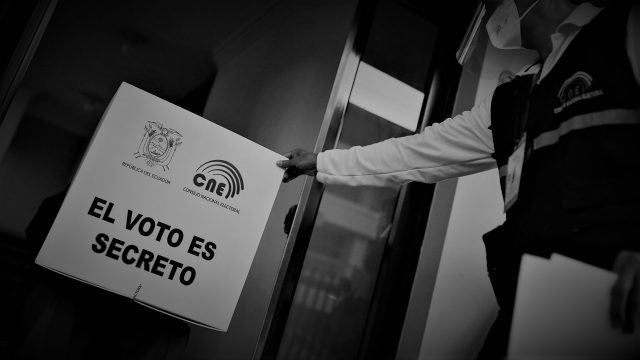Last weekend, the second round of the presidential elections was held in Ecuador in which the right-wing Guillermo Lasso, from the Creando Oportunidades (CREO) movement, was victorious, in alliance with the Partido Social Cristiano (PSC), who was attending for the third time in search of the country’s presidency.
Lasso prevailed against Andrés Arauz, from the left-wing Union por la Esperanza (UNES) coalition, which brings together Correismo. With 98.55% of the valid records computed by the National Electoral Council (CNE), Lasso reached 4,615,772 votes, 52.43% of the total; while Arauz got 4,187,835 votes, 47.57%.
But there was also another protagonist: the null vote. With the same percentage of valid records, 1,746,231 invalid votes were counted. These ballots could have given a different result in the elections, giving a higher percentage to Lasso or favoring Arauz.
In an article by journalist Edgar Romero, RT correspondent in Ecuador, it is explained how the null vote defined the destiny of Ecuadorians for the next few years, especially from the wing of the former candidate Yaku Pérez.
Promotion of «null»
The promotion of the null vote was made by Yaku Pérez, who belongs to the Pachakutik Plurinational Unity Movement. The resolution was also accompanied by the Confederation of Indigenous Nationalities of Ecuador (CONAIE) itself. The decision was made after Pérez did not go to the second ballot because he came in third place in the first round of the presidential elections, held on February 7.
In that first round, Pérez and Pachakutik denounced an alleged fraud against them, which favored Lasso – with a difference of just over 32,000 votes – and removed him from the electoral race. On February 23, after days of protests, he presented 27,767 ballots with alleged irregularities to the CNE to demand that the votes be counted; After analyzing them, the entity determined that only 31 would be counted.
Faced with this decision, they went to the Contentious Electoral Tribunal (TCE), in order to nullify the CNE’s resolution so as to be able to obtain the recount, but this instance also ruled against them on March 14.
While the case was being studied by the TCE, on March 10, the CONAIE held its Expanded Council, in which they determined that if the TCE prevented the recount, they would not support any candidate in the second round and would promote the «ideological null vote».
Divisions of the indigenous community of Ecuador
As the election date in Ecuador was getting near in the horizon, the positions of some leaders changed. On April 3, during a ceremony in the Cofán Dureno community in Sucumbíos province, the president of CONAIE, Jaime Vargas, shook Arauz’s hand and told him that his government proposals have «the full support of the indigenous movement”.
«Jaime Vargas’s decision does not represent the decision of the indigenous movement and, worse, of Pachakutik», said Marlon Santi, national coordinator of the political organization, during a press conference, in which he announced the expulsion of the president of CONAIE from the party, of which he was an adherent.
Pérez, on his part, said: “Mr. Vargas made visible the support that he had for the correísmo a while ago. Vargas was supporting Arauz all his life. What’s more, we thought he was going to do it in the first round».
Vargas, in addition to being the president of CONAIE, is well known for leading the October 2019 anti-government protests against the Lenín Moreno government, following the announced measures, such as the elimination of the fuel subsidy, in response to an agreement that the Executive had reached with the International Monetary Fund (IMF). The demonstrations that were supported by sectors of the Ecuadorian left, including supporters of Correismo.
On February 7, the CONAIE ratified that it would go to the elections last Sunday with the flag of the null vote. So did Leonidas Iza Salazar, president of the Cotopaxi Indigenous and Peasant Movement (MICC), another of the great figures of the October 2019 protests.
Apart from Vargas, Virna Cedeño, former candidate for the Vice-presidency for Pachakuitk in a binomial with Pérez, expressed her support for Lasso. From Pachakutik they also announced the ‘separation’ of Cedeño. Although he was not an adherent of Pachakutik, Santi recalled that he had signed an «act of commitment» to «be loyal in the decisions» made by the party in the electoral process.
Sabotage to Ecuador?
On Sunday, at the moment he ‘voted’, Pérez, so as to annul his vote, wrote on the ballot: «Yaku president, resistance», which he then showed to the media.
Later, when he testified, he said that this was a way of resisting before a CNE «splattered by corruption» and alleged that the invalid vote served to pressure so that «sometime there will be transparency».
According to the CNE results, Pachakutik’s call for a null vote appears to have had an effect. If it is taken into account that in the first round the invalid votes were 1,013,395 (9.55%), during the second ballot that percentage grew.
With 98.55% of the valid records computed, more than 1.74 million citizens cast a null vote, that is, more than 16% of the ballots. The percentage is considerable and augurs a decisive factor for negotiation between the country’s political sectors.


